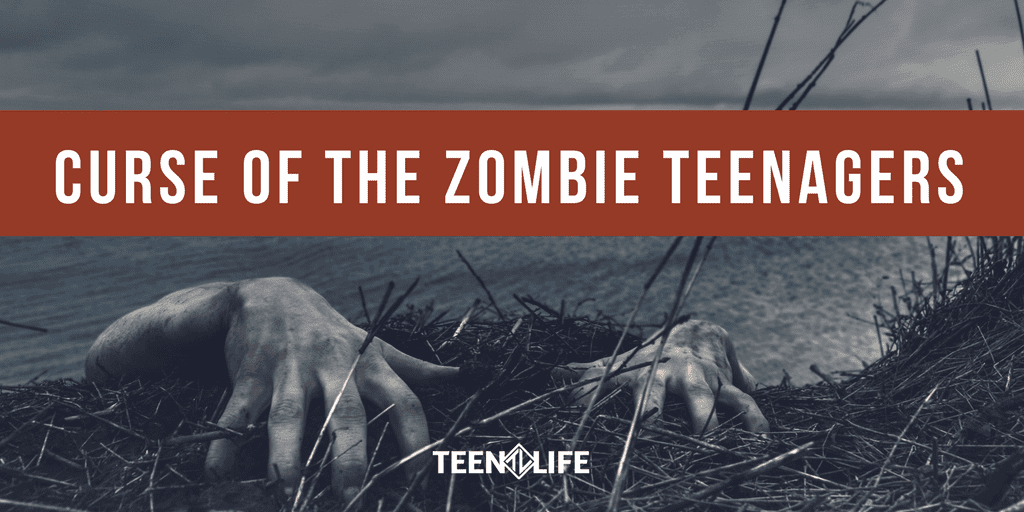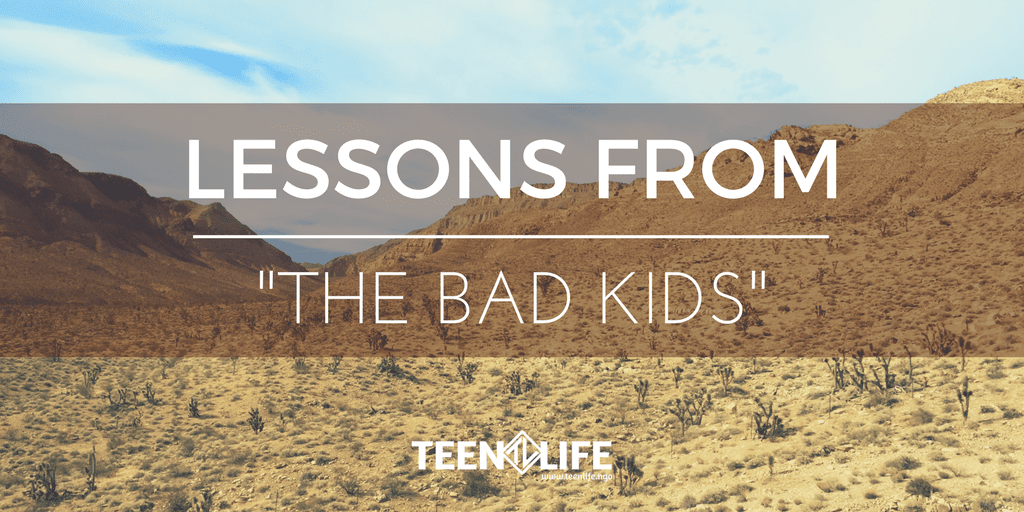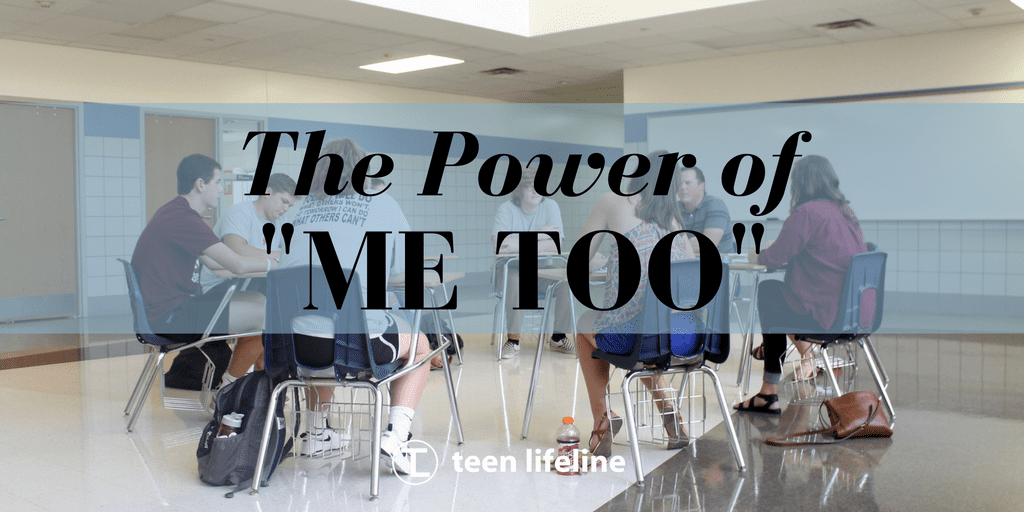
by Karlie Duke | Nov 16, 2017 | Mental Health, Parenting, Support Groups
Sometimes as a new mom, I feel like I am experiencing a small part of adolescence all over again. Sleepless nights, learning new skills and little control over hormones are just a few things that remind me of those teenage years.
The most debilitating of these “symptoms”? Definitely the lack of sleep. I feel like I can barely function some days.
While facilitating a Support Group at a local Alternative High School this week, we talked about school and discussed how they felt about it. With only one exception, everyone in the group mentioned tiredness and how it affected their school performance. They were falling asleep at their desks, unable to focus on their work, and too tired to even come to school some days. They were walking Zombies!
However, when I asked how they could make school better, none of them talked about getting more or better sleep. Isn’t that interesting? Even though sleep is the one thing they need, they didn’t seem to see how missing out on sleep or going to bed late could negatively impact their whole day.
A few weeks ago my son, Sawyer, went through a sleep regression that had him waking up every 2-3 hours through the night. I had gotten used to waking up once a night but two or three? I was thrown for a loop!
That week and a half, I noticed several things. I was unfocused. I was grumpy. I was lazy. I was emotional. I found myself apologizing to my husband more than usual. Now I am not saying that during normal weeks I am never unfocused, grumpy, lazy or emotional (because I am), but I notice significant increases in these areas when I am tired.
If tiredness can have this affect on me, imagine the impact that the lack of sleep can have on teenagers! According to this WebMD article and SleepAdvisor.org, there are several surprising effects that lack of sleep can cause:
It can cause accidents. Did you know that driving sleepy can cause similar reaction delays to driving drunk? When our students don’t get enough sleep, they could be a danger to others and themselves!
It can impair memory and learning. Not getting enough sleep can harm cognitive processes. This means that it affects alertness, focus, attention, and reasoning. When teenagers don’t get an adequate amount of sleep, they also won’t be able to remember what they experienced throughout the day, having a major affect on learning and retention.
It can lead to depression. Sleepiness can contribute to the symptoms of depression and anxiety. It can also create a vicious cycle – lack of sleep causes depression, and in return, depression can make it hard to fall asleep. Our teenagers do not need another thing that leads to depression and anxiety.
It can cause health problems. Sleep deprivation can cause many health issues from heart disease to obesity. It makes sense if you think about it. Our bodies need sleep to function and when you take that away, your body suffers and tries to make up for it in other ways.
It can impair judgement. When teens (or people in general) do not get enough sleep, they cannot accurately assess events or experiences which can lead to a lack of judgement. This can also apply to a lack of judgment about the affect of sleep-deprivation!
Teenagers are in one of the most important periods of growth. Their brain is developing, their body is growing, they are learning to interact socially. To do these things positively and set them up for success in the future, they need sleep. Plain and simple, this is one of the best things you can teach your teenager today.
They don’t have to be Zombies just because they are teenagers. They can be functioning, smart, witty and alert – if they get the sleep they need!
Let’s encourage teens to turn off the television or gaming system, put down the phones and go to bed at a decent hour. They may push back at the request, but they will be thankful when they are healthy, productive, happy, and making good decisions.
How have you seen the impact of lack of sleep? What things can we do to encourage teenagers to get more sleep? Share your ideas – we would love to hear them!
Karlie Duke was in one of Teen Life’s original support groups and now is our Communications Director. She is passionate about encouraging students to live better stories.

by Chris Robey | Nov 2, 2017 | Personal Development, Support Groups
The points of my life where I am the most frustrated and discontent are the points where progress halts. I’ve never been a productivity guy, as in rigid schedule keeping or meeting long-term goals, but my general hope is that I am moving in a positive direction and improving various aspects of my life.
In so many ways, this is why I love my work with Teen Life as a Support Group leader. We get to sit with students week after week and talk about what could be better and challenge ourselves to go out and do the work it takes to make it happen. Often these gains are small, but they mean a lot.
Which is why I was struck by a productivity philosophy relatively unknown outside of business schools and self-help circles – The Kaizen Method. Roughly translated (from Japanese) it means “continuous slow improvement”.
The method came into western consciousness after World War II when American automobile makers visited a Toyota automobile plant to research why they were so efficient and error-free in their production lines. Up to this point, American automobile assembly lines were notoriously sloppy and wasteful.
What they found was surprising – essentially any worker on the assembly line had been given the authority to stop the production line if they saw a mistake or flaw in the work, address the issue, then start production again. And on top of that, any worker had the agency to point out flaws in the overall system or even minor details that would make things better.
This is no small deal. Traditionally, outsourcing feedback to assembly line workers was unheard of, and stopping a production line could be costly. Was it really necessary? Couldn’t these small changes be made in ways that kept the production line moving?
When you compare Japanese vehicles to American ones in that time period, the quality and vehicle output were not even close. By far, Japanese vehicles ran farther, had greater overall customer satisfaction, and held greater value than American cars.
And all of this was attributed to the Kaizen Method – the idea that quality products and healthy growth happens not from great individual leaps, but more from small, incremental growth – consistent over time.
When workers were given freedom to fix small problems, flaws in the system were noted in real time and fixed. In American factories, production lines never stopped so if there was a problem, they wouldn’t know until they had to strip down a car and start all over again. Problems were never fixed and the end result was a complete mess.
After this method was uncovered, productivity experts started to apply this principle to self-improvement. The idea manifested in several ways, but one way really stands out – the 1% improvement principle.
The idea is if you really want to develop a habit or get better at something, you need to do so at a very slow pace. Basically, you aim to get 1% better or more regular at doing something each day. And, it actually starts that way if you are starting from scratch.
For example, if you don’t read regularly and you want to, you would start by reading 1 minute a day, then 2 minutes the next, and so on. You are allowing your brain to feel small successes while also building habits over time. So often we want to start a healthier lifestyle by radically changing what we do or going “cold turkey”. But with this principle, we prevent our brain from getting overloaded and stressed – allowing for healthy change over a long period of time.
This works in our support groups with teenagers and my guess is it can work for you. Here are some tips:
- Choose one thing you want to do differently or better in the coming month. Only choose one thing.
- Start day one with a small expression of what you want to be doing well in a month. An example would be if you want to save more money than you spend, spend one less dollar on something you normally would. Or, go on a one minute walk.
- Make sure you schedule that minute or small activity. Even though it is small, it needs to be scheduled so you do it.
- Add small increments on top of it. Map it out over a month so you can see your progress.
- Finally, don’t feel guilty for such small steps. You are working on life change, not just trying something new. These things take time, and any time you give is a step in a positive direction.

by Karlie Duke | May 11, 2017 | Mental Health, Resources, Support Groups
I am a huge fan of Netflix. In the mood for a comedy, drama, thriller or documentary? You can choose from thousands of TV shows and movies. While I typically watch Netflix for personal gain, I recently came across a documentary called The Bad Kids (you can also find it on iTunes and Amazon). I’ll confess – I am not a documentary person. Give me fiction and fairy tales all day! But this particular documentary intrigued me because I work with students just like the ones highlighted in this film. I work with “The Bad Kids” every week, and I wanted to see what I could learn from the heart and work of someone halfway across the country.
Before I go any farther, I would like to make a disclaimer that this post is not endorsing this film, saying that I agree with every part of documentary, or even asking you to go watch it. While an accurate portrayal of this population of students, there is extreme language used throughout the film. That being said, I found value in the methods and practices used by the film and believe that it is worth my time to share what I learned!
On their website, The Bad Kids summary is:
At a remote Mojave Desert high school, extraordinary educators believe that, more than academics,
it is love, empathy and life skills that give at-risk students command of their own futures. This coming-of-age
story watches education combat the crippling effects of poverty on the lives of these so-called “bad kids.”
It is so refreshing to see the media recognize excellent educators and administrators for the difficult work they do with students each and every week. We have the privilege of working with counselors, principals, teachers and staff who also believe that love, empathy and life skills can make a huge difference in the lives and academic careers of students – that is why they partner with us!
In this film, you see students who are in a tough place and deal with circumstances that most adults would struggle with. There is teen pregnancy, sexual assault, substance abuse, absent parents and so much more that they face in addition to their school responsibilities. There is no question that these “bad kids” have difficult lives (both by personal choices and unavoidable tragedy), but the Black Rock Continuation High School chooses to step in for these students who are at risk of dropping out of school completely.
While watching this film, I saw several important tactics that can not only benefit the work done with at-risk students but can be applied to any relationship with a teenager. One thing I have found in my work with Teen Life is that you don’t have to be a “bad kid” to desire love, empathy and help with challenges.
Teens need empathy.
For a refresher on empathy, please read my last blog post on the subject! But this documentary fully supports how much empathy and a listening ear matters to teenagers. At this particular High School, Principal Vonda Viland is a superb example of what empathy looks like and how it can affect a relationship. Students trust her, are honest with her and seek out her advice because they know that she will listen. And she doesn’t always have the answers. Sometimes, she admits that their life is difficult. And instead of subjecting them to a lecture she asks simple questions like, “What do you think needs to change? How would that decision affect your life? What needs to happen for you to get motivated?”
Empathy is a powerful tool.
Teens need to be held to a high standard.
Is life challenging for these teenagers or any teen in general? Absolutely. But they do not need to be babied or held to lower standards because of it. When you treat a teenager with respect and clear standards, they are more likely to rise to the occasion. I love that Principal Viland does not hold back any punches with her students. From their first day on her campus, she tells them what is expected and what the consequences are if these expectations are not met. She is not going to hold their hand, drag them out of bed or force them to come to school. But to stay in her school, students have to play by her rules and most do. In the film, you see so many students thrive under this straightforward approach. They know what to expect and what is expected of them.
When held to a high standard, teenagers have the opportunity to live up to their potential.
Teens need motivation.
Teens can be stubborn – but can’t we all? Most of the time, they don’t want to do something if it won’t benefit them in some way. And I understand that. I remember the frustrating days of learning about geometry and astronomy and wondering, “Will I ever use this information again?” What I love about The Bad Kids is that the teachers make an effort to put what they are learning into context for each student. For example, one of the boys loves music and playing his guitar but hates math. He is struggling and doesn’t see the point. Instead of getting defensive or giving up, his teacher puts it in perspective – you need math to play music. As she explains this concept, it clicks. He just needed the motivation to see past his current frustration and situation.
Motivation and inspiration could be the difference in a student graduating and dropping out.
Teens need celebration.
We need to celebrate our teenagers better! They are more likely to repeat good behavior when it is praised than to stop negative behavior when it is punished. Let’s be a positive force for our teens and get excited when they accomplish a goal. Principal Viland shows this all throughout the film. She celebrates when they come to school on a consistent basis. She even hands out certificates for completing credits and recognizes hard work in front of the entire school. She tells them when she sees improvements and recognizes when they avoid old habits. Celebration can be a small thing, but even something as small as a $5 gift card makes a huge impact on a teen who is trying to survive.
May we not get caught up in the bad things teens do, but intentionally look for ways to celebrate the good things!
Karlie Duke was in one of Teen Life’s original support groups and now is our Communications Director. She is passionate about encouraging students to live better stories.

by Karlie Duke | Oct 6, 2016 | Events, Mental Health, Parenting, Support Groups
Earlier this week, we held our 2nd annual Teen Lifeline Fundraising Dinner & Auction, and I am still blown away by the generosity and support that come from this night. One of my favorite parts of the night came when Beverly Ross spoke truth over the audience.
If you haven’t heard of Beverly Ross or Wise County Christian Counseling, I would encourage you to go check them out!
At this dinner, Beverly Ross challenged us by saying, “We need to teach our children that it’s not going to be okay. It’s going to be hard, but you’re never going to do it alone.”
Until she said this, I had never thought about the danger of saying, “It’s going to be okay!” When little kids are upset, we tell them it will be okay. When someone dies, we say that it will be okay eventually. In those teenage years, we talk about their future and that everything will be better – friends, parent relationships, school, drama, their purpose…the list could go on and on.
But can we guarantee that everything will be okay? That things will get better?
We cannot promise that their life will be perfect or happy or even “okay,” but we can promise the teenagers around us that when it gets hard, when life is less than okay, that they will have someone to walk with them. They are not alone. They don’t have to struggle by themselves.
This is the power of Teen Lifeline Support Groups! More than anything, they provide a safe place for teenagers to talk about things that are both okay and not okay. They give perspective and understanding for other people’s struggles. They make sure that every teen participating has at least one adult and a group of peers to do life with.
As Beverly said, there are few words more powerful than “me too!” In the midst of pain, heartache, struggles, questions and life in general, teenagers need to be surrounded by others who can say, “Me too!”
“Me too” implies understanding and acceptance.
Think back to your teenage years. Did you ever feel alone, different, lost? What would have happened if someone had looked you in the eye and said, “Me too.”
Let’s stop making empty promises to our children. Telling them that it’s going to be okay is not helpful for anyone when you can’t actually guarantee what their future is going to look like. What is helpful is giving them a chance to meet and be encouraged by others who understand what they are going through. No fixing is required. You don’t have to have all of the answers, but take the time to listen and respond with, “Me too.”
So, what do you think? How has the phrase, “Me too,” impacted your life? What can we say instead of, “It’s going to be okay?” Share your thoughts and stories with us!
Karlie Duke was in one of Teen Lifeline’s original support groups and now is our Communications Director. She is passionate about encouraging students to live better stories.

by Karlie Duke | Apr 14, 2016 | Parenting, Support Groups
The more I work with teenagers, the more evident is that they are their own worst enemy and biggest critic.
Check out this story from one of our facilitators, Josh Hardcastle, about a conversation that happened in his support group with teenage guys:
A couple of weeks ago, we were talking about the negative influences and negative voices in our lives. Some of the guys in the group spoke up and were talking about how when other people put them down, they believe it. They believe that they…
Are Lazy.
Are Stupid.
Won’t Succeed.
Are Slow.
Are Punks.
Can’t get anything right.
So then I threw out the question, “What if you didn’t believe them?”
I had remembered a line from a book I read that said something like, “The names that we embrace are the names that we become.” I shared with them some of the struggles with the names that I had been called in High School by a coach. After hearing it so many times, I began to believe that I was that name.
There was something about this whole conversation and group time that really clicked with them. I could actually see hope and strength starting to resonate with a few of them. They were sitting up straight and absolutely silent. Not because they didn’t know what to say, but because it looked like they were thinking about not believing they were these names that they had been called for so long.
Towards the end of the group time, one of the guys asked, “So does this work with me too? Because I put myself down more than anybody else.”
Man that broke my heart! But we were able to have a conversation as a group about what that looked like and how we can avoid embracing the negative names and voices we call ourselves. I closed out the group by asking, “What do you guys notice about everyone’s pages and what they heard from the important voices in their lives?” A few of them gave me the answers that most everybody had written down their family or best friends, but one of my quiet kids raised his hand and said, “Everyone has more than two important, positive voices who speak into their lives.”
I took it one step further and asked, “So what does that mean?” Another guy jumped in and said, “That we should be listening and focusing on the positive voices and ignoring the negative ones.”
Boom. Nailed it.
Teenagers are surrounded by all kinds of negative and critical voices, but these voices do not just come from outsiders. Sometimes, the worst thoughts are coming from inside their own heads.
So what can we do? How can we help encourage teenagers to think positively and be a better judge of their self-worth? I have a few suggestions for what we can do as parents, teachers, mentors and friends:
1. Ask questions that will allow them to brag.
Instead of bringing up that “B” on a test, or the fact that they were late getting home (…again), ask one of these questions: “What is one thing that you did really well today?” or “How did you help someone today?”
By asking these question, you are prompting their own brain to focus on the positive aspects of the day. You are telling them that they are capable of great things and you want to hear about the things that they are going well.
Let’s help train teens to engage in beneficial bragging! Bragging that fosters a good sense of self-worth and positive self-esteem.
2. Point out the little things.
Did your teen wash the dishes without being asked? Say, “THANK YOU!”
Resist the urge to say something like, “What’s wrong with you?! You never do the dishes without asking!” or “Finally! Now you’re doing the dishes every night for the rest of your life!”
I know this might be a silly example, but by encouraging the little things they do without adding a backhanded dig or sarcastic comment, they will also pay attention to the important role they can play!
Tell them when you are proud. Hang up that last report card on the fridge. Brag about the way they love on their siblings. Teenagers are necessary, helpful, hardworking and FUN – don’t forget that!
3. Encourage realistic goal-setting.
When I am hard on myself or engage in negative self-talk, it tends to be when I am disappointed in myself or feel like I haven’t reached the goal I set for myself. After a busy week, I am upset that the house is a little messy and that I didn’t cook every meal at home. I beat myself up when I miss one tiny detail on a big project, or find a typo in a blog post.
Goals are a great thing to have, but we should be realistic and not sweat over the little things! Encourage teenagers to set small goals. When they reach that goal, help them celebrate and especially if they don’t matter – forget about the tiny things that might not be perfect.
Perfection isn’t a realistic goal. But here are a few realistic goal examples for teenagers:
- Be on time to school in the morning – who cares if you forgot to brush your hair or ate a pop tart instead of a well-rounded, healthy breakfast?!
- Help with one thing around the house – start small by making the bed, or doing the dishes after dinner!
- Improve on the next test – don’t get upset if the next grade isn’t a perfect 100, but strive to do better than that last test!
Once you help them come up with, write down and spend time on their goals, don’t forget to celebrate when a goal is reached!
What do you think of these ideas? How else can we encourage teenagers to engage in positive self-talk?
Karlie Duke was in one of Teen Lifeline’s original support groups and now is our Communications Director. She is passionate about encouraging students to live better stories.







